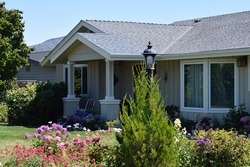Reverse Mortgage Terms You Should Know

A layman’s glossary of 34 terms commonly used during the process of arranging a mortgage.

A layman’s glossary of 34 terms commonly used during the process of arranging a mortgage.

As a leader in reverse mortgage lending for over 40 years, we work closely with mortgage professionals, community bankers, attorney’s, credit unions and retirement planners to help senior homeowners convert a portion of their home equity to fund long-term retirement plans, allowing you to age in place.

Reverse Mortgages – A Tax Free Income For Senior Citizens
I fully realize if it sounds too good to be true, it probably is and There Ain’t No Such Thing As A Free Lunch (TANSTAAFL) immediately jumped into your head when you read the title of this article. However, if you are 62 or over, you may have just found a loophole for you and not just the ones you hear about for all those large corporations.
A reverse mortgage is exactly what the name implies. Rather than you paying a monthly mortgage to your mortgage (lender) company, a mortgage company pays you. How is that possible you might ask? Well we are about to tell you.
Continue reading

Are your parents struggling to make ends meet with their retirement income? Many homeowners are taking advantage of reverse mortgages as a means of being able to live more comfortably during their retirement years. A reverse mortgage offers individuals aged 62 or older to tap into the equity in their homes as a means of supplementing their monthly incomes.
Getting a reverse mortgage does not involve selling the home, nor does it require the homeowner to take on a new monthly payment. With a reverse mortgage, instead of the homeowner paying the lender, the lender pays the homeowner. Reverse mortgages can come in very handy for helping with day-to-day living expenses, as well as with unexpected and emergency expenses.
Continue reading

Once you’ve done your research on reverse mortgages and gained a more complete understanding of the product, the next step is to decide if a reverse mortgage is right for your situation. If you’re eligible (a homeowner 62 years of age or older with equity in your principal residence), this may be a quick decision or one that requires a bit more consideration. As with any decision, it’s always helpful to get the perspectives and experiences of others who have faced similar situations and asked themselves the same questions. So for those other folks who have decided to get a reverse mortgage, what were their reasons? We’ve asked some of our readers and site visitors and below are the top 5 reasons people get reverse mortgages:

Explore Reverse Mortgage Solutions
Do I Need Good Credit For a Reverse Mortgage?
|
“My house is worth a lot, My Income is very low, and my credit is bad for lots of reasons. Can I still get a reverse mortgage on my home?” | ||
 | Senior , Homeowner Bad Credit | |
Bottom Line is…. Yes
Continue reading

Reverse mortgages are loans against your home that require no repayment for as long as you live there. As opposed to regular mortgage loans, reverse mortgages have no income requirements and are based solely on the equity of your home or condo. There are no monthly payments to make as the mortgage is due only when the borrower is no longer living at the residence.

Why you should consider a reverse mortgage?
Homeowners that are over 62 of age whose lifestyle might improve or to maintain their lifestyle by using the reverse mortgage as part of their retirement planning. It’s another financial tool available to senior homeowners over 62.
Are you in this situation?
How Does a Reverse Mortgage Work?
A Reverse Mortgage works like this. First you need to qualify for a reverse mortgage loan, which means you must own a home, be at least 62 years old and have enough equity built up in your
home. The reverse mortgage loan works by making payments to you the borrower based upon the percentage of equity that you have built up in the home. The loan is repaid when you the borrower
sells the home, moves out of the home or dies. The items/considerations that impact the proceeds (net cash) in which you may be eligible for include your age, the value of your home, interest
rate and whether your home conforms with the Federal Housing Administration’s (FHA) mortgage limit of $679,650.
Do I still own my home?

Reverse Mortgage- is it a big risk?
What are the advantages and disadvantages of reverse mortgage?
Are you running into a big risk?
A reverse mortgage is a special type of loan that home owners can sometimes get to convert the equity in their homes to cash. Simply, a reverse mortgage is a type of loan that provides you with a monthly income, a lump sum of cash, or a line of credit. Or a combination of both